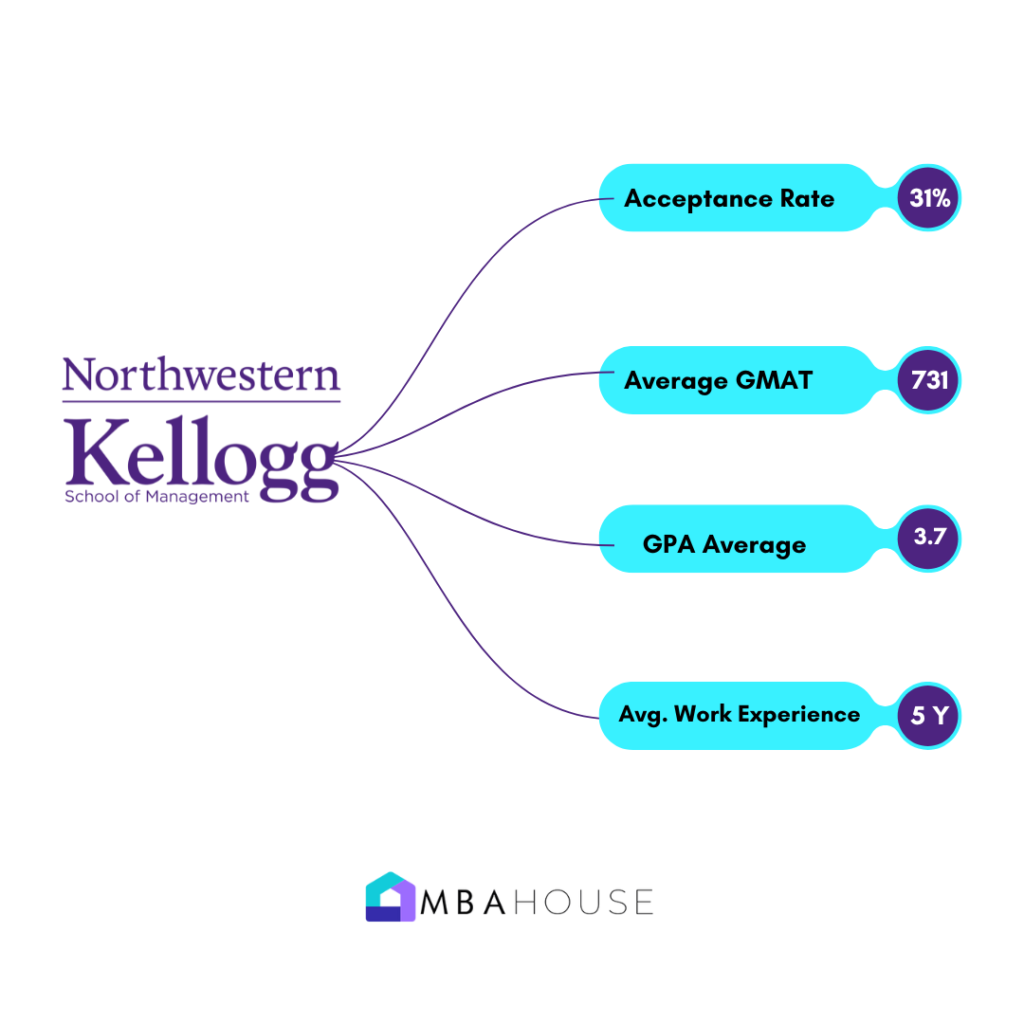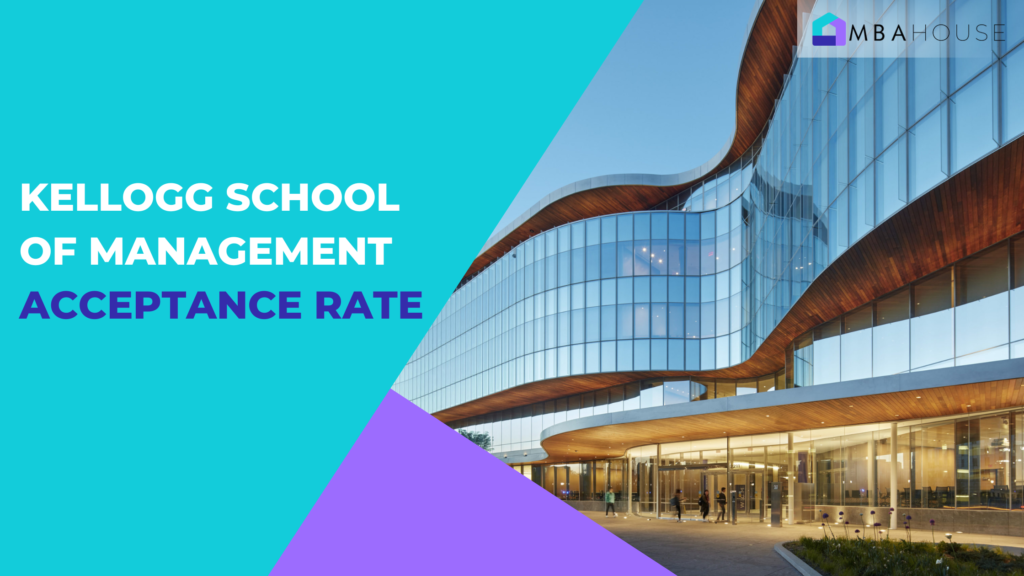If the Kellogg School of Management is your dream, you’re in luck – it’s ranked No. 3 (tie) out of 124 in the latest Best Business Schools rankings by U.S. News & World Report. And for part-time MBA programs, Kellogg ranks No. 3 out of 269.
Kellogg is the graduate business school of Northwestern University, founded in 1908 and located in Evanston, Illinois. It’s known for its interdisciplinary approach and global focus. With its prestigious reputation and strong alumni network, it’s no wonder the Kellogg MBA acceptance rate is a key consideration for many aspiring students.
In this blog, you’ll learn everything you need to know about gaining admission to the Kellogg School of Management at Northwestern University. From understanding the Kellogg MBA acceptance rate and class profile to mastering the application process and financial planning, this comprehensive guide covers it all.
For the 2023-2024 school year, the full-time MBA class had 503 students, with 38% international. The class profile is impressive – an average GPA of 3.7 and an average GMAT score of 729. Kellogg also accepts the GRE, with average scores of 162 in Verbal and 163 in Quant.
Kellogg received 4,187 applications and accepted 1,316 full-time students, resulting in a 31.4% acceptance rate. That makes Kellogg one of the more accessible M7 schools.
So, what does it take to get in? University of Kellogg looks for leadership, work experience, and a strong academic background. Remember, the acceptance rate is just one factor. They want applicants who demonstrate authenticity and self-awareness, and who can show a deep understanding of the Kellogg culture and community.
This is just the beginning. There’s so much more you need to know. Let’s dive into the stats!
Quick Insights: Kellogg MBA

What is the Northwestern Kellogg MBA Acceptance Rate?
| Class Year | Acceptance Rate |
| Class of 2022 | 21% |
| Class of 2023 | Not released |
| Class of 2025 | 31% |
| Note: Some acceptance rates are based on estimates as many MBA programs did not release this information for the class of 2025. |
Undergraduate Majors in Kellogg’s MBA Program
| Major Category | Percentage |
| Business / Economics | 50% |
| STEM | 38%no |
| Humanities | Business / Economics |
Demographics of Kellogg’s MBA Class
| Category | Percentage |
| Women | 48% |
| International Students | 39% |
| U.S. Students of Color | 42% |
| First-Generation College | 13% |
Kellogg’s Top Pre-MBA Industries
| Industry | Percentage |
| Consulting | 26% |
| Financial Services | 19% |
| Technology | 19% |
| Note: Kellogg’s average GMAT is 731, the median GRE is 163 (Verbal and Quant), and the average undergraduate GPA is 3.7. This continually increasing average GMAT reflects Kellogg’s focus on intellectual aptitude, highlighting the ever-growing talent pool. |
Now let’s tackle the big question you might be asking:
How Do I Get Into Northwestern University Kellogg School of Management?
Getting into the Kellogg School of Management at Northwestern University requires a well-rounded application and a good understanding of what the admissions committee is looking for.

Here’s a comprehensive guide to help you through the process and why you should bother to know:
1. Academic Background
- Undergraduate Degree: A bachelor’s degree from an accredited institution is required. Your undergraduate major doesn’t need to be in business, but coursework in calculus and statistics can be beneficial.
- GPA: Aim for a strong GPA. The average GPA for admitted students is around 3.7.
2. Test Scores
- GMAT/GRE: Kellogg accepts both GMAT and GRE scores without preference. The average GMAT score for admitted students is about 731, and the median GRE scores are 163 in both Verbal and Quant.
- English Proficiency: International applicants may need to submit TOEFL, IELTS, or Duolingo English Test scores if their undergraduate degree was not conducted in English.
3. Professional Experience
- Work Experience: Most successful applicants have at least two years of full-time work experience. The average work experience is around five years.
- Leadership and Impact: Kellogg values leadership and the ability to drive change. Highlight experiences where you’ve taken initiative, led teams, or made a significant impact.
4. Application Components
- Essays: Kellogg’s application includes several essays. These essays are your opportunity to showcase your personality, career goals, and why Kellogg is the right fit for you. Be authentic and provide specific examples to illustrate your points.
- Resume: Your resume should detail your professional journey, highlighting key achievements and career progression.
- Letters of Recommendation: Typically, you’ll need two letters of recommendation. Choose recommenders who know you well and can speak to your professional strengths and potential for success in an MBA program.
- Interview: If invited to interview, prepare to discuss your application in detail. Be ready to explain your career choices, leadership experiences, and why you want to pursue an MBA at Kellogg.
5. Diversity and Inclusion
- Diverse Backgrounds: Kellogg values diversity in its student body. Women make up 48% of the class, 39% are international students, and 42% identify as U.S. students of color. Additionally, 13% of students are first-generation college students.
- Inclusive Community: Emphasize how you will contribute to and benefit from Kellogg’s diverse and inclusive community.
6. Industry Experience
- Pre-MBA Industries: Many Kellogg students come from consulting (26%), financial services (19%), and technology (19%). If you have experience in these fields, be sure to highlight your relevant skills and achievements.
7. Financial Planning and Scholarships
- Kellogg MBA Tuition: The tuition for the Kellogg MBA program is approximately $27,918 per quarter. It’s important to plan your finances carefully to cover tuition and other associated costs.
- Kellogg Scholarship: Kellogg offers various scholarships based on merit and financial need. Scholarships such as the Kellogg Scholarship for Women in Business support female leaders in business.
- Northwestern MBA Program Cost: Besides tuition, consider additional costs like books, accommodation, and living expenses. The total cost of attendance can be significant, so planning ahead is crucial.
8. Tips for a Strong Application
- Start Early: Give yourself plenty of time to gather materials, reflect on your experiences, and craft thoughtful responses.
- Research Kellogg: Understand Kellogg’s values, culture, and programs. This will help you tailor your application and demonstrate your genuine interest in the school.
- Seek Feedback: Have mentors, colleagues, or MBA advisors review your application materials and provide constructive feedback.
- Networking and Relationships: Attend Kellogg’s admissions events, connect with alumni, and current students. Understanding the program deeply and building relationships can provide valuable insights and strengthen your application.
By understanding these key areas and thoroughly preparing your application, you’ll be in a strong position to navigate the Kellogg admissions process. Remember, the Kellogg MBA acceptance rate is competitive, so make sure to present a well-rounded and authentic application that showcases your strengths and fit for the program.
At MBA House, we believe that your MBA journey is a project with many components that need optimization. We offer comprehensive admissions consulting designed to optimize every aspect of your MBA application journey.
Our unlimited support includes personalized meetings, essay revisions, interview training, and more, ensuring you receive tailored guidance to achieve your goals – making your dream of attending the best B-School a reality!
For more information reach out to us at: [email protected]
More Acceptance Rate Pages





Social Media